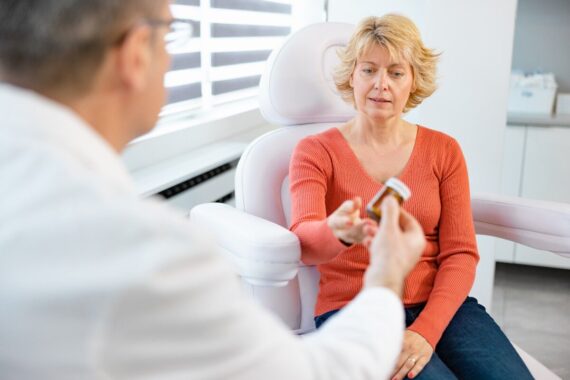A group of researchers has called for a new approach to menopause, warning it has been overmedicalised and hijacked by commercial interests.
In a series of four papers in The Lancet, researchers from the UK, US, and Australia have argued that ‘an over-simplified narrative of menopause as a health problem’ to be solved by replacing hormones is not based on evidence.
And that framing deflects from a ‘substantial societal shift’ that is needed in how menopause, and midlife or older women in general, are viewed and treated around the world.
Co-author Professor Martha Hickey from the University of Melbourne said: ‘The misconception of menopause as always being a medical issue which consistently heralds a decline in physical and mental health should be challenged across the whole of society.’
She added that changing the narrative to view menopause as ‘part of healthy ageing’ may better empower women to navigate it and reduce fear and trepidation for others not yet at that stage of life.
An individualised approach should provide women with accurate, consistent and impartial information to make informed decisions about the right approach for them which could include hormone replacement therapy (HRT) to help alleviate some symptoms as well as psychological therapies such as cognitive behavioural therapy (CBT).
It follows high-profile campaigns which have helped to increase awareness of menopause
but the researchers said they had concern about the media’s tendency to focus on extreme negative experiences of menopause which can only be solved by HRT.
Dr Lydia Brown also from the University of Melbourne added: ‘Whilst it’s certainly the case that some women have extremely negative experiences of menopause and benefit from hormone therapies, that isn’t the whole picture.
‘The reality is much more complex and varied, with some women reporting neutral experiences and others highlighting good aspects, such as freedom from menstruation and menstrual pain.’
They called on healthcare professionals to support their patients by validating their experiences and providing balanced and consistent information about symptoms and treatment options if needed.
Co-author Dr Andrea La Croix from the University of California San Diego said there were several medications available to help with symptoms such as hot flushes and night sweats.
‘However, no medication can reliably resolve all negative experiences during menopause and commercial interests have influenced how menopausal hormone therapy is presented – overshadowing evidence-based alternative options.’
Professor Myra Hunter from King’s College London added that clinicians should also discuss additional ways to manage some menopausal symptoms, such as CBT and lifestyle changes addressing diet, smoking and exercise which may benefit sleep and mood and improve long-term health.
‘Our series is all about increasing awareness of evidence-based options for women, so they can choose how they wish to navigate menopause, free from judgement and stigma,’ she said.
The team also called for more research into aspects of the menopause that are a priority for women and said workplaces have a role to play in creating open, inclusive and supportive cultures.
For those women who experience menopause prematurely, included those being treated for cancer, there are often delays to diagnosis and they can feel distressed and isolated, the researchers noted. This group may also be at increased risk of cardiovascular disease and osteoporosis which may be reduced by HRT.
When NICE draft guidelines on the menopause were published in November, campaigners called for more ‘balanced’ wording around the benefits of hormone replacement therapy (HRT), as well as for more consideration and detail to be given to the use of testosterone.
The British Menopause Society said the papers in the series around optimising health, promoting good mental health and managing menopause after cancer were in keeping with current guidelines including those from NICE.
But they questioned the part of the series that focused on overmedicalisation.
Paula Briggs, BMS chair and consultant in sexual and reproductive health said: ‘Historically, there has been a lack of information about the menopause and some women have found it hard to get the treatment they need.
‘This is changing for the better, and there is concern that the use of the word “overmedicalisation” could in fact lead to the disempowerment of women. A balanced approach is important, to ensure that the women who need treatment get it.’


















READERS' COMMENTS [5]
Please note, only GPs are permitted to add comments to articles
Finally, some common sense against the rhetoric of the TV non- doctor brigade, need more conversation rather than the current ongoing GP bashing by one and all about how little is known and “my GP never prescribed me HRT” rubbish out there. Just like everything else in medicine, it is not one size fits all and HRT doesn’t cure all knows problems after the age of 51.
An enterprising journalist could look at how the hrt zealots managed to seize control of the RCGP menopause training.
Also, just what is the relationship between Newson Health and The Times newspaper.
I’ve been a GP over 20 years now.
I wonder how many of those years there has NOT been a headline saying either that GPs are over-prescribing HRT or that GPs are under-prescribing HRT…
This sensible research could not have originated in the UK where the country is drowning in a confused mess of policy by social influence. This issue has not only been over medicalised, it’s been politicised too. UK politicians cant help themselves, another toxic side effect of our dysfunctional and politicised NHS.
Is it not hormonal replacement therapy for those with premature ovarian failure/oophorectomy , and hormone augmentation therapy (HAT) for everyone else?